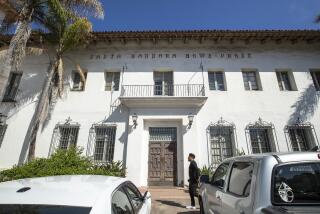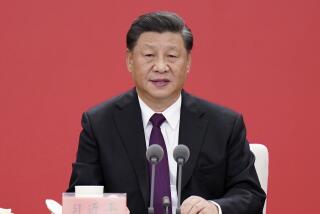Shanghai Newspaper at Center of Maelstrom
- Share via
SHANGHAI — There are few places outside of Beijing where the fate of the pro-democracy students at Tian An Men Square was monitored with more open concern than in a small newspaper office on Huai Hai Road in Shanghai.
It is the home of the World Economic Herald, viewed by many as a pacesetter for press freedom in China. The weekly newspaper openly linked economic reform with greater political freedom and thus was at the center of a debate that turned into a major power struggle in China.
When its editor was shunted aside by Communist authorities, that setback for press freedom became another issue in the current campaign by students and other intellectuals for liberalization.
One recent Herald article was entitled, “Neo-Authoritarianism and Modernization.” Another asked, “Can the new authoritarians represent new productive forces?”
The Herald stood clearly on the side of Zhao Ziyang, the beleaguered Chinese Communist party chief now in eclipse. In the face of student protests and demand for democracy, Zhao was abandoned by his mentor, senior Chinese leader Deng Xiaoping, in favor of conservative Premier Li Peng. Speculation is that he will be purged from the party.
As Zhao goes, so may the Herald, which was considered to be a major outlet for his thoughts. Since May 8, publication of the weekly has been halted by the Shanghai Communist Party.
“Our main task was to openly discuss China’s problems. We hope to be able to continue. Our ideas were clear. Economic and political openness go hand in hand,” deputy editor Zhu Xingqing said in an interview last week.
The Herald’s problems began with its treatment of the death of former Communist Party head Hu Yaobang. Hu died of a heart attack April 15, and subsequent public memorials to him became the focal point for the student campaign to reform China’s political system.
On April 24, the Herald eulogized Hu as “a great Marxist.” That may seem innocent enough, considering Hu’s term as Communist Party general secretary, but against the backdrop of deep splits, the praise set off political fireworks. The late party leaders Mao Tse-tung and Chou En-lai are called “great Marxists,” but Hu?
Hu, an advocate of democratic reform and reduced government control of the economy, fell from power in early 1987 after taking a conciliatory position on student protest demonstrations.
Opponents of Hu, and now of Zhao Ziyang, have been trying both to re-establish greater control by the Communist Party over Chinese economic life and to head off what they label the “bourgeois liberalization” of Chinese politics.
The Shanghai Communist Party ordered the April 24 edition of the Herald destroyed. A “work committee” from the party arrived to censor the next two editions. Finally, after the May 8 edition published an editorial calling for journalistic freedom, the printing presses were shut down. The paper’s 40 reporters and editors have been left in limbo.
“We hope this is only temporary, but we really don’t know,” said Zhu, 41.
Zhu said that the sticking point over the paper’s future is who will run it. The chief editor, Qin Benli, 72, has been forced out, Zhu said. The party wants a new editor appointed by the Academy of Social Sciences, a party-controlled group formally in charge of the paper. The journalists want the Chinese World Economic Federation, an autonomous group, to make the choice.
More to Read
Sign up for Essential California
The most important California stories and recommendations in your inbox every morning.
You may occasionally receive promotional content from the Los Angeles Times.













